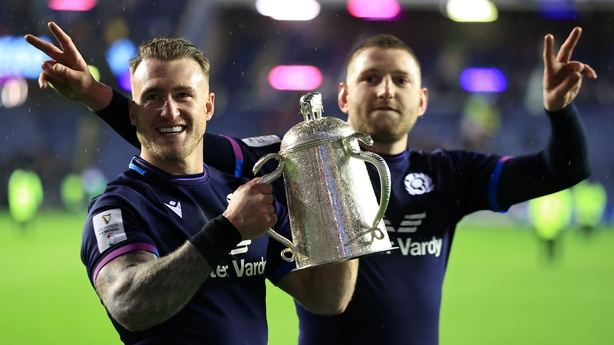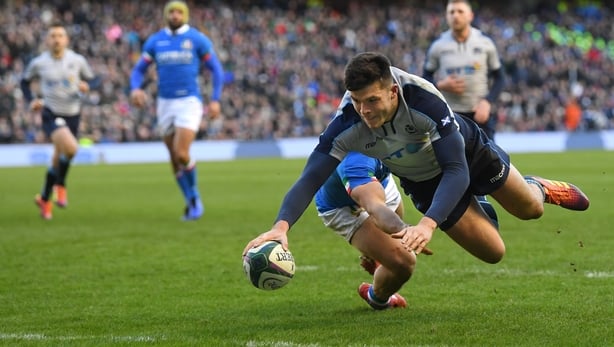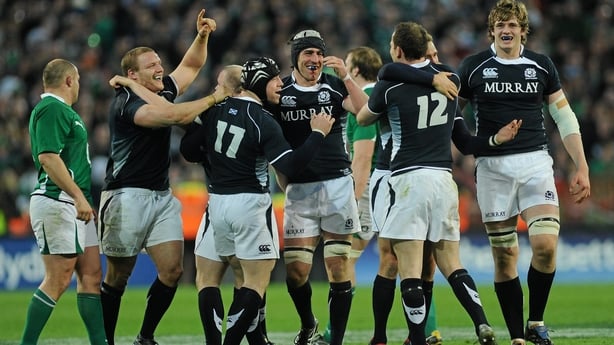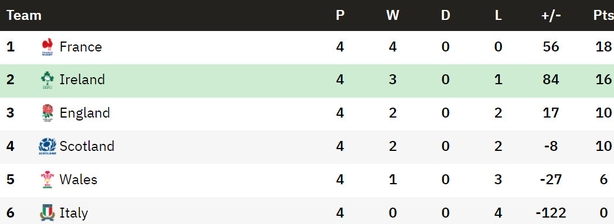We've learned a lot since the first weekend of February.
We've learned that Johnny Sexton is still the man, but that the sky won't fall down if he's not around.
We've learned that Ireland have committed to their fast and open style of rugby, and won't revert to type when the game is in the balance.
If we didn't already know it, we've learned that Marcus Smith is the real deal, but that England haven't found the right cast to support him.
We've learned that France have the deepest pool of talent in the game, and that anyone who denies them a home World Cup win next year will need to find several extra gears.
We've learned that World Rugby are willing to hammer you for uncontested scrums, while some people are still yet to learn that 'head equals red'.
And as Scotland prepare to cap off their campaign against Ireland, we've learned that Gregor Townsend's side still struggle to back it up week-to-week.
There's an air of mid-2000s Ireland about Scotland. They have all the tools to trouble any team in the game, but still struggle to do it consistently over a block of games.
They tend to play up and down to the level of their opposition, multiple wins against both England and France in recent seasons have been offset by defeats to more vulnerable Irish and Welsh sides.
"They're so frustrating, aren't they?" remarked Donal Lenihan on this week's RTÉ Rugby podcast.

"It's one step forward and two steps back. Defensively they were the outstanding team in the Six Nations for the last two years.
"It's almost as if they looked to move their game on from being a defensive team, and have lost their concentration on that."
Bernard Jackman echoed those thoughts.
"On paper they are better they were, but yet bar the England game there hasn't been evidence of that."
It wouldn't be one of the great Six Nations shocks if they were to roll over Ireland this afternoon, and that's precisely where the frustration stems from. After their steely, gritty win against England at Murrayfield, they were beaten by a limited Wales team, in a game they should never have been in a position to lose.
The selection of Kinghorn is a bit of a curveball, and Ireland's batting average on curveballs this season has only been OK.
And while their attack showed plenty of spark against Italy, they plodded their way through the final quarter.
It was enough for Gregor Townsend to drop Finn Russell for the second time in three seasons. Blair Kinghorn steps into number 10 for what initially appeared to be a performance call, before it emerged yesterday Russell wasone of several players disciplined by head coach Gregor Townsend.
Kinghorn (below) has been around for long enough in the international stage. This afternoon's game at the Aviva Stadium will be his 30th Test, but just his second as a starting out-half.

"I watched the Connacht game [v Edinburgh] and Blair was the best player on the pitch by a country mile," said Ireland head coach Andy Farrell yesterday, admitting to a degree of surprise that Russell was dropped to the bench.
The selection of Kinghorn is a bit of a curveball, and Ireland's batting average on curveballs this season has only been OK.
When Josh Adams was surprisingly picked at centre rather than wing at the Aviva Stadium in Round 1, Ireland smashed it out of the park, but against both Italy and England they seemed to play fractured rugby despite a numerical advantage, and they struggled to find answers for the questions asked of them at the scrum last week, even if some were trick questions.
Aside from out-half, Scotland's team boasts plenty of quality; last year's Player of the Tournament Hamish Watson is as good as any openside in the world when it comes to attacking the breakdown, while Chris Harris is one of the classiest defenders in the game at centre.
Farrell's side should have no reason for complacency with the possibility of a Six Nations title still live, and while they also rely on England to win away in Paris, a convincing Irish win tomorrow would put a bit of heat under the French.
Stuart Hogg remains as threatening as ever, although the captain's struggles for consistency have mirrored his team throughout the championship.
In the pack, Jonny Gray's return from injury at second row is a huge boost, while Pierre Schoeman has been excellent at loosehead in the absence of Rory Sutherland, with the Edinburgh prop as comfortable in the scrum as he is distributing the ball.
Historically speaking, Ireland have had answers for Scotland though.
The 2010 defeat at Croke Park is Ireland's last on home soil against the Scots, while you'd have to go back to 1998 for the last time a Scottish team won at Lansdowne Road.

And while Ireland have won six in a row against Gregor Townsend's side, the most recent Six Nations meetings have been close, with Ireland's 2020 and 2021 wins both being one-score victories.
Farrell has made three changes to his side, with Mack Hansen, Iain Henderson and Jack Conan all brought back in, with Andrew Conway and James Ryan ruled out due to injury, and Peter O'Mahony rotating back to the bench.
For Scotland, today's game will be a free shot at Ireland, who have some pressure of their own.
Farrell's side should have no reason for complacency with the possibility of a Six Nations title still live, and while they are also reliant on England winning in Paris, a convincing Irish win tomorrow would put a bit of heat under the French.
Regardless of what happens in Paris, there is also the Triple Crown to play for.
It doesn't carry the same weight as it did in 2004 when Ireland beat Scotland to end their 19-year wait for the crown, but with more than 10 of this weekend's squad yet to experience an international title, having a piece of silver to lift in front of the Aviva Stadium would be a step in the right direction, heading towards the World Cup.
"It would be very special," said Ireland captain Sexton, who along with Cian Healy was part of the Ireland team beaten by Scotland at Croke Park 12 years ago,.
"Once we had lost that game to France we set our targets on this. It's the only thing that is in our control. If we can get a win and if we can do that, then we’re guaranteed. Obviously for us then that would be a good thing and then we can sit back and watch the end of it.

"But we have to hold our end of the bargain up. We have to make sure that we play really well. We have to perform on the big stage which is where we’re at. We want to perform for people who come and watch us.
"So all our focus is on our performance but yeah it’s good to know that if we do get it right and get a win that we’ve got a chance to lift some silverware in front of all those people."
The title may have been the goal entering this championship, but three home wins and a bonus point success in one of the two tough away trips would have been broadly accepted by Irish fans eight weeks ago.
All that's left to do is finish the job. Once more, with feeling...
Verdict: Ireland
Ireland: Hugo Keenan; Mack Hansen, Garry Ringrose, Bundee Aki, James Lowe; Johnny Sexton (capt), Jamison Gibson-Park; Cian Healy, Dan Sheehan, Tadhg Furlong; Tadhg Beirne, Iain Henderson; Caelan Doris, Josh van der Flier, Jack Conan.
Replacements: Rob Herring, Dave Kilcoyne, Finlay Bealham, Kieran Treadwell, Peter O'Mahony, Conor Murray, Joey Carbery, Robbie Henshaw.
Scotland: Stuart Hogg (capt); Darcy Graham, Chris Harris, Sam Johnson, Kyle Steyn; Blair Kinghorn, Ali Price; Pierre Schoeman, George Turner, Zander Fagerson; Jonny Gray, Grant Gilchrist; Rory Darge, Hamish Watson, Matt Fagerson.
Replacements: Fraser Brown, Allan Dell, WP Nel, Sam Skinner, Josh Bayliss, Ben White, Finn Russell, Mark Bennett.
Listen to the RTÉ Rugby podcast on Apple Podcasts, Soundcloud, Spotify or wherever you get your podcasts.
Follow all of Ireland's Six Nations games via our live blogs on rte.ie/sport and on the RTÉ News App or listen to live radio coverage on RTÉ Radio 1.
Watch live coverage of Lions v Munster (12pm), Wales v Italy (2.15pm) and France v England (8pm) this Saturday, 19 March on RTÉ2 and RTÉ Player.


